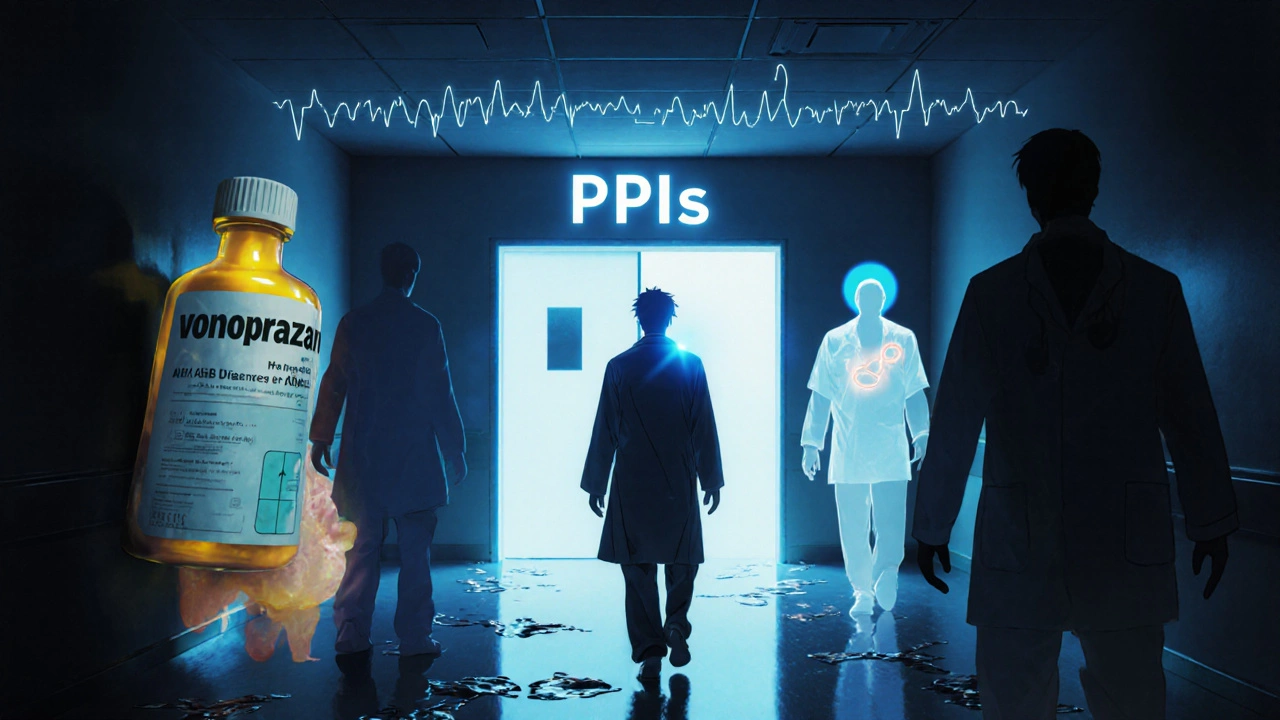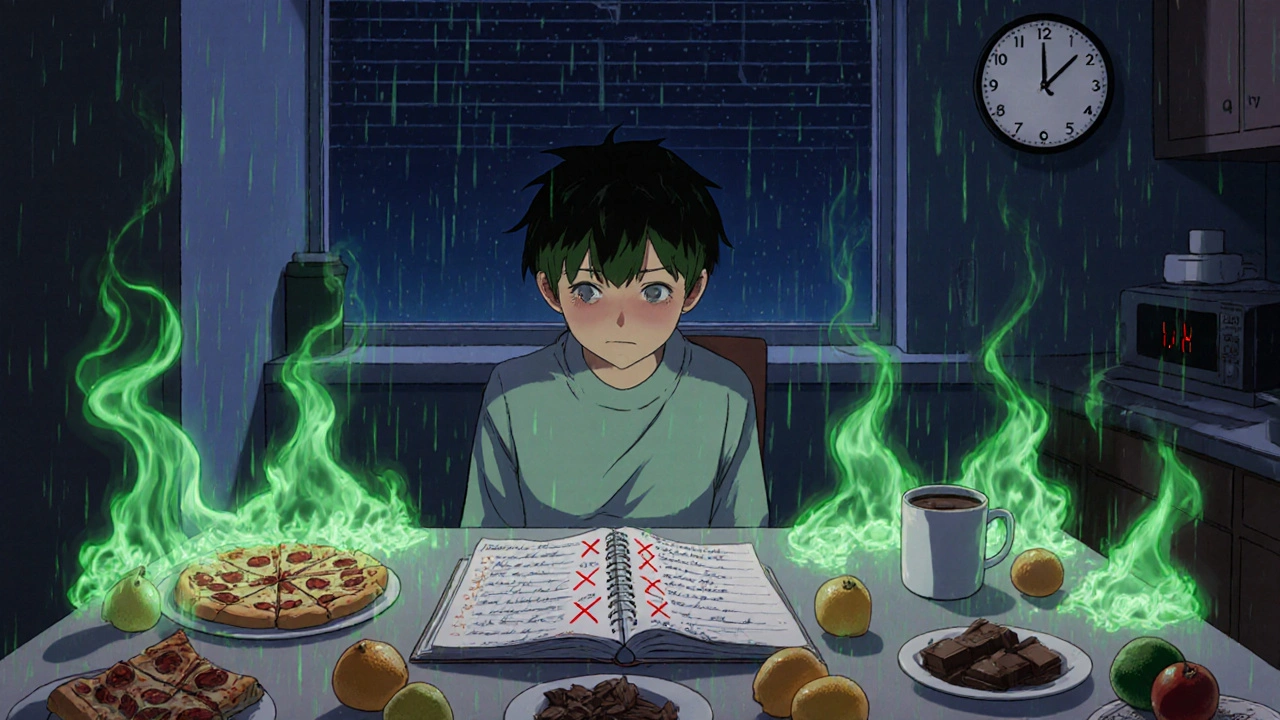If you're waking up with a sour taste in your mouth, burning in your chest after dinner, or feeling like food is stuck behind your breastbone, you're not alone. About 20% of people in the U.S. deal with GERD - gastroesophageal reflux disease - regularly. It’s not just heartburn. It’s a chronic condition where stomach acid flows back into your esophagus, often more than twice a week. Left unchecked, it can damage your esophagus, lead to Barrett’s esophagus, and even raise your risk of esophageal cancer. The good news? Most people can get it under control without surgery - if they know what actually works.
Start with What You Eat (and When)
Diet is the first and most powerful tool in managing GERD. It’s not about cutting out everything. It’s about spotting your triggers. Studies show that certain foods relax the lower esophageal sphincter (LES), the muscle that keeps acid down, or irritate the lining of your esophagus directly.Fatty foods are a big one. Meals with more than 30 grams of fat slow down stomach emptying by 40 to 60 minutes, giving acid more time to creep up. That’s why pizza, fried chicken, or creamy pasta often set off symptoms. Reduce dietary fat to under 30% of your daily calories, and many people see a 40% drop in reflux episodes.
Then there are the classic offenders: coffee, chocolate, peppermint, citrus, tomatoes, and carbonated drinks. Coffee increases acid production by 23% within 30 minutes. Chocolate contains methylxanthine, which loosens the LES by 10-15%. Peppermint relaxes it by 15-20%. Citrus and tomato products are acidic enough (pH as low as 2.0) to burn your esophagus directly. Carbonated drinks puff up your stomach, pushing pressure upward and forcing acid out.
But here’s the catch: triggers vary. One person can eat spicy tacos with no problem. Another breaks out in flames from a single slice of pizza. That’s why keeping a food diary for at least two weeks is critical. Write down what you ate, when you ate it, and how you felt an hour later. Most people find 2-3 specific foods that are their personal triggers. Once you know them, you can avoid them - no need to ban everything.
Lifestyle Changes That Actually Work
Food isn’t the whole story. How you live between meals matters just as much.Smoking cuts LES pressure by 30-40% within minutes. If you smoke, quitting is one of the most effective things you can do. Alcohol does the same - limit yourself to under two standard drinks a day. Even one glass of wine can trigger reflux in sensitive people.
Weight is another major factor. Losing just 10% of your body weight can improve GERD symptoms by 40%. That’s not a vague suggestion - it’s backed by clinical data. If you’re overweight or obese, even modest weight loss reduces pressure on your stomach and helps the LES stay closed.
Timing matters too. Lying down within an hour after eating increases reflux episodes by 50%. Wait at least three hours after your last meal before going to bed. Elevating the head of your bed by six inches - using blocks or a wedge pillow - helps gravity keep acid where it belongs. Regular pillows won’t cut it; they just bend your neck, not your torso.
And don’t underestimate breathing. Diaphragmatic breathing - slow, deep breaths that expand your belly, not your chest - can reduce symptoms by 35% when practiced for 15 minutes after meals. It’s simple: inhale through your nose for four counts, hold for two, exhale through your mouth for six. Do it after lunch and dinner. It’s not magic, but it’s free and has no side effects.

Medications: From Antacids to P-CABs
If diet and lifestyle changes aren’t enough, medications step in. They’re not a cure, but they’re highly effective for most people.Antacids like Tums (calcium carbonate) give quick relief by neutralizing acid. But they only last 30-60 minutes. Great for occasional heartburn, useless for daily GERD.
H2 blockers like famotidine (Pepcid) reduce acid production by 60-70%. They kick in within an hour and last 10-12 hours. Good for mild symptoms or as a backup if you forget your PPI.
But for moderate to severe GERD, proton pump inhibitors (PPIs) are the gold standard. Drugs like omeprazole (Prilosec), esomeprazole (Nexium), and pantoprazole (Protonix) cut acid production by 90-98%. They heal erosive esophagitis in 80-90% of patients within eight weeks. That’s better than H2 blockers, which only heal about half.
But timing matters. PPIs only work if taken 30-60 minutes before your first meal of the day. That’s when your stomach’s acid pumps are waking up. Taking them at night? You’re wasting them. A 2023 Mayo Clinic study found 40% of patients don’t get relief because they take their PPIs wrong.
Long-term PPI use comes with risks. The FDA warns of increased chances of pneumonia, C. diff infections, kidney disease, and low magnesium levels after a year of use. If you’ve been on PPIs for more than a year, ask your doctor about checking your magnesium and vitamin B12 levels.
Enter the new kid on the block: potassium-competitive acid blockers (P-CABs). Vonoprazan (Voquezna), approved by the FDA in December 2023 and expanded for long-term use in May 2024, works faster and lasts longer than PPIs. It keeps stomach pH above 4 for 24 hours in 95% of users - compared to 65% with PPIs. That’s huge for people who suffer from nighttime reflux, which affects 70% of PPI users. It’s not for everyone, but if your PPI stopped working, it might be worth a try.

Surgery: When Medications Aren’t Enough
About 10-15% of people with GERD need surgery. That’s not because they failed - it’s because they want to stop taking pills long-term, or their symptoms are getting worse despite meds.The most common procedure is laparoscopic Nissen fundoplication. Surgeons wrap the top of your stomach around your esophagus to reinforce the LES. It’s 90-95% effective at stopping reflux at five years. But 5-10% of people end up with trouble swallowing, and 15-20% get gas-bloat syndrome - where you can’t burp, and your stomach feels full all the time.
The LINX device is a newer option. It’s a small bracelet of magnetic titanium beads implanted around the LES. It lets food pass through normally but snaps shut to block acid. In 85% of patients, it eliminates the need for daily PPIs after five years. It’s less invasive than fundoplication, and most people recover in a week. But it’s not for everyone. You can’t get an MRI after it’s implanted, and it’s not recommended if you’ve had prior stomach surgery.
Then there’s TIF - transoral incisionless fundoplication. It’s done through your mouth with a special device, no cuts needed. Success rates are around 70-75% at three years. But there are only about 127 certified providers in the U.S. as of early 2025. It’s promising, but still niche.
Some experts, like Dr. Lauren Gerson from Stanford, argue that surgery should come earlier for patients with documented acid reflux. Her data shows 85% of surgical patients stay symptom-free at 10 years, compared to just 45% on long-term meds. Others, like Dr. Stuart Spechler from UT Southwestern, warn that not all GERD is caused by acid. Some people have “non-erosive reflux disease” - their esophagus is sensitive, even if acid levels are normal. For them, meds may not help much, and surgery won’t fix the problem.
What Works for One Person Might Not Work for Another
There’s no one-size-fits-all fix for GERD. Reddit’s r/GERD community has over 140,000 members sharing stories. One person says a strict low-fat diet and head-elevation eliminated their symptoms. Another says PPIs worked for five years, then stopped - so they got LINX and haven’t had a flare-up in two years.On Amazon, 12% of omeprazole reviews mention vitamin B12 deficiency. On Trustpilot, 22% of LINX users report lingering gas-bloat issues. These aren’t rare side effects - they’re common enough to plan for.
The key is personalization. Your GERD isn’t the same as your neighbor’s. What works for them might not work for you. That’s why the American College of Gastroenterology recommends a stepwise approach: start with diet and lifestyle, then add meds as needed, and only consider surgery if everything else fails - or if you’re ready to stop taking pills for good.
And don’t forget: GERD is manageable. It’s not curable, but it’s controllable. Most people who stick with the basics - avoiding triggers, waiting to lie down, taking meds correctly - live symptom-free. You don’t need to suffer. You just need to know what to do next.
Can GERD be cured without medication?
Yes, for some people. Many individuals with mild to moderate GERD eliminate symptoms through diet changes, weight loss, avoiding late meals, quitting smoking, and elevating the head of the bed. Studies show that losing 10% of body weight can reduce symptoms by 40%. However, if you have esophageal damage or severe reflux, medication is usually needed to heal the tissue and prevent complications.
Are PPIs safe for long-term use?
PPIs are effective but not risk-free over time. Long-term use (over one year) is linked to a higher risk of pneumonia, Clostridium difficile infection, chronic kidney disease, and low magnesium or vitamin B12 levels. The FDA recommends monitoring blood magnesium levels every six months if you’ve been on PPIs for over a year. If you’re using them long-term, talk to your doctor about whether you still need them or if you can switch to an H2 blocker or lifestyle-only management.
What’s the difference between GERD and occasional heartburn?
Heartburn is a symptom - a burning feeling in the chest. GERD is a chronic condition diagnosed when heartburn happens more than twice a week, or when it causes inflammation or damage to the esophagus. Occasional heartburn after a spicy meal is normal. If it’s frequent, disrupts sleep, or doesn’t respond to antacids, it’s likely GERD and should be evaluated.
Does stress make GERD worse?
Stress doesn’t cause GERD, but it can make symptoms feel worse. It increases sensitivity to acid in the esophagus and may lead to behaviors like overeating, drinking more alcohol, or skipping meals - all of which trigger reflux. Managing stress through breathing, exercise, or mindfulness can help reduce symptom severity, even if it doesn’t stop the reflux itself.
Can I stop taking PPIs cold turkey?
No. Stopping PPIs suddenly can cause rebound acid hypersecretion - your stomach overproduces acid for weeks, making heartburn worse than before. If you want to stop, work with your doctor to taper slowly, often by switching to an H2 blocker first, then reducing it gradually. Combine this with strict lifestyle changes to avoid a flare-up.
Is the LINX device right for me?
LINX may be a good option if you’ve tried PPIs for at least six months with poor results, want to avoid lifelong medication, and don’t have severe esophageal damage. It’s not recommended if you’ve had prior stomach surgery, have a BMI over 40 (though newer approvals allow up to 40), or need future MRI scans. Talk to a surgeon who specializes in reflux procedures to see if you’re a candidate.

